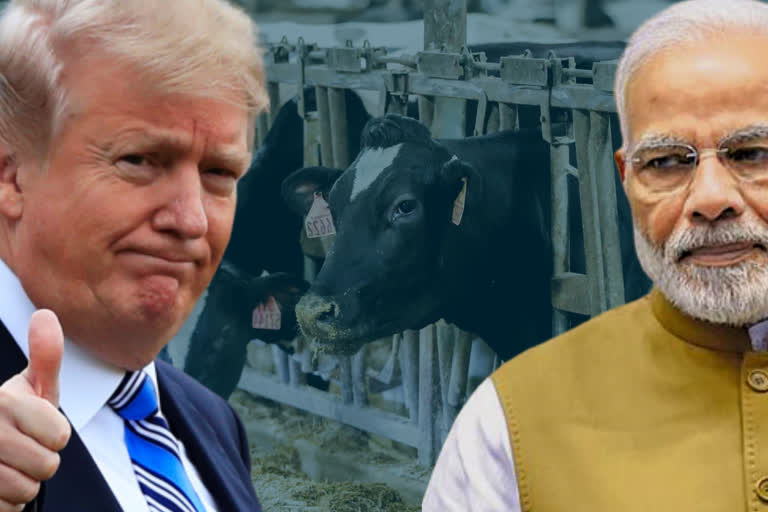Hyderabad: After his recent acquittal from the impeachment proceedings, US President Donald Trump prepares to tour India for the first time in the third week of this month. There are indications that the US-India bilateral trade, which has been under severe strain for some time, is likely to be back on track with concrete solutions.
It is well known that the Trump government, which strongly defends India's active role in global politics, when it comes to trade aspects, is adopting a policy of 'America First' with increased taxes. India also responded equally strongly and the uncomfortable trade situation is unpalatable to both the countries.
Read also: Trump refuses to roll back tariff despite Ph-1 of trade deal with China
Against this backdrop, there are fears that if we agree to the trade concessions demanded by the Trump administration, the domestic agriculture and the dairy industry will greatly suffer.
Read also: Exclusive: India-US Trade, Iranian Crisis and its regional impact for India
As desired by Washington, if tariff and non-tariff barriers are eliminated and the doors of domestic markets are opened for their corn, cotton, soy, wheat, and dry fruit (nuts) products, the Farmers' Unions are worried that it will be catastrophic for us.
The question is whether India, which has more than 15 million small farmers surviving on the dairy income from one or two cows or buffaloes, will be able to withstand the tough competition of the US dairy products which are heavily subsidized.
If American cotton is imported, domestic cotton farmers' lives will be in danger and if genetically modified products are imported, the security of life will be at stake. As Narendra Modi's government voiced strongly the Indian viewpoint on the platform of the Regional Comprehensive Economic Partnership (RCEP) in November last and protected the interests of Indian farmers, everyone desires that in dealing with America also we should be free from fear or favor.
Trump wanted to reduce their trade deficit by professing that 'trade wars are good....and can be easily won" and increased taxes on imports from India and China.
When New Delhi and Beijing also increased taxes on American imports, there was an uproar from American farmers. Now Trump is trying to get over the crisis with ad hoc contracts. Though the Trump government has been complaining that, 'For many years India has been levying heavy trade tariffs on America; it has become the king of tariffs,’ the Modi government argues that the tariffs imposed by India on the basis of 'trade volume average' are not much.
On the basis of a complaint from the dairy and medical appliance industry that due to trade restrictions exports were slowing, the US has removed India from the list of GSP (Generalized System of Preferences) in July last.
At a time when India is pushing for a GSP revival, news has already surfaced that the US has been bargaining for a billion-dollar (Rs.71 thousand crores) trade deal and has already succeeded on medical equipment. While India wants simplified import regulation of mangoes, grapes and pomegranate fruits, the US wants to open gates for export of $600 billion of agriculture products.
The Ministry of Commerce had already cautioned in 2015 that if the wish of the US to reduce import tariffs on poultry products becomes a reality and chicken and eggs are imported at very cheap rates, the domestic market will be affected up to 40%.
This unequal competition will hit India very hard. The bilateral share of India's trade volume with the US is hardly three percent. In the last fiscal year, India's exports to the US were $5240 billion and imports $3550 billion. Even if the trade deficit falls to $1690 billion, the Trump government's wish to make big profits by grabbing the Indian market, does not realize the plight of Indian farmers.
According to the Organization for Economic Cooperation and Development (OECD), our government has lost over Rs 2 lakh 65 thousand crores in 2016 alone in the game plan of support prices of governments. Whereas in the same year, China contributed $2,200 billion to its farmers, and the OECD, a 36-nation alliance, supported $1,200 billion!
At a time when the Indian farmer is in deep trouble if American imports are also allowed, his position will be like falling from pan to fire. If the import tariff on poultry is reduced from the present 100% to 30% as desired by the US or undue leniency is shown on dairy imports, it will have a great impact on agro-based industries. It is the duty of the Modi government not to compromise on the interests of the peasantry who work hard for our food and keep the nation going.



